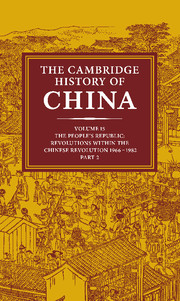Book contents
- Frontmatter
- 1 Mao Tse-tung's thought from 1949 to 1976
- PART I THE CULTURAL REVOLUTION: CHINA IN TURMOIL, 1966–1969
- PART II THE CULTURAL REVOLUTION: THE STRUGGLE FOR THE SUCCESSION, 1969–1982
- PART III THE CULTURAL REVOLUTION AND ITS AFTERMATH
- 6 China's economic policy and performance
- 7 Education
- 8 Creativity and politics
- PART IV LIFE AND LETTERS UNDER COMMUNISM
- PART V THE SEPARATED PROVINCE
- Epilogue: the onus of unity
- Appendixes: meetings and leaders
- Bibliographical essays
- Bibliography
- Index
- Map 1: China’s physical features
- Map 2. PRC: political (Wade–Giles romanization)
- Map 3. PRC: political (pinyin romanization)
- Map 7: Population
- References
6 - China's economic policy and performance
from PART III - THE CULTURAL REVOLUTION AND ITS AFTERMATH
Published online by Cambridge University Press: 28 March 2008
- Frontmatter
- 1 Mao Tse-tung's thought from 1949 to 1976
- PART I THE CULTURAL REVOLUTION: CHINA IN TURMOIL, 1966–1969
- PART II THE CULTURAL REVOLUTION: THE STRUGGLE FOR THE SUCCESSION, 1969–1982
- PART III THE CULTURAL REVOLUTION AND ITS AFTERMATH
- 6 China's economic policy and performance
- 7 Education
- 8 Creativity and politics
- PART IV LIFE AND LETTERS UNDER COMMUNISM
- PART V THE SEPARATED PROVINCE
- Epilogue: the onus of unity
- Appendixes: meetings and leaders
- Bibliographical essays
- Bibliography
- Index
- Map 1: China’s physical features
- Map 2. PRC: political (Wade–Giles romanization)
- Map 3. PRC: political (pinyin romanization)
- Map 7: Population
- References
Summary
INTRODUCTION
Few really new economic ideas or policies were put forward during the Cultural Revolution decade (1966–76). There were economic debates leading up to and during the Cultural Revolution, but these debates had their roots in an earlier period, specifically in the Great Leap Forward and its immediate aftermath, when Chinese high and low attempted to understand what had gone wrong.
By 1956 the Chinese state had completed the takeover of private industry and commerce, and agriculture had been collectivized. The tools of planning and control over this socialized economy had been borrowed wholesale from the Soviet Union. China's economic strategy emphasizing machinery and steel was virtually a carbon copy of Stalin's development strategy for Russia in the 1930s.
This choice of planning tools and development strategy in part reflected a view among the leaders of many developing countries at the time that the Soviet Union represented the one real alternative to capitalist economic development, and a very successful alternative at that. China's leaders shared this view of Soviet accomplishments, but from the beginning they were uneasy with many features of the Soviet economic system. The sources of this uneasiness varied among the senior Chinese leaders. Some were concerned with the rigidities of the highly centralized system of planning and control, and others knew that China could not afford to follow the Soviet lead in neglecting agriculture. At some point, Mao Tsetung and those close to him became bothered by the implications the Soviet system held out for the increasing bureaucratization of society and its emphasis on values more consistent with capitalism than with the future communist ideal.
Keywords
- Type
- Chapter
- Information
- The Cambridge History of China , pp. 473 - 539Publisher: Cambridge University PressPrint publication year: 1991
References
- 6
- Cited by

